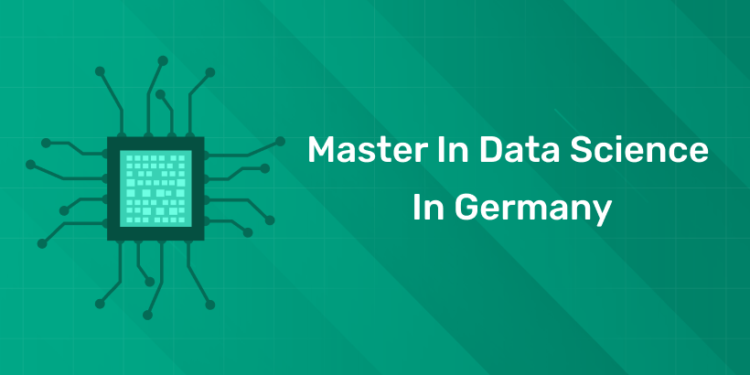Table of Contents
Introduction
With data driven decision making in the digital age data science has become one of the most sought after fields globally. Germany with its high academic standards and innovation driven economy is becoming a top destination for data scientists. Studying a Master’s in Data Science in Germany means you get access to world class education, state of the art research facilities and vast career opportunities within and beyond Europe. This blog will guide you through everything you need to know about studying data science in Germany, including top universities, admission requirements, job prospects and scholarships.
Why Study Data Science in Germany?
Germany is a global leader in science, engineering and technology. Here are some of the reasons why studying Data Science in Germany is great:
1. High Quality Education
Germany has many top universities that offer world class data science programs. These universities focus on a combination of theoretical knowledge and practical skills which is essential for a data science career. Many of Germany’s public universities offer tuition free or low cost education for both domestic and international students which means high quality education is affordable.
2. Strong Economy and Innovation Hub
Germany has a strong economy and is one of the top countries in terms of technological innovation. Data science plays a key role in industries like manufacturing, finance, healthcare, automotive and logistics which are all big industries in Germany. With the growth of AI and machine learning sectors there is high demand for data scientists in Germany.
3. Research and Development Opportunities
Germany is known for its research and development (R&D). Many universities collaborate with top tech companies and research institutions which means students get to work on real projects. This hands on experience in real world applications of data science.
4. Global Career Prospects
A Master’s in Data Science from a German university is recognized globally. Germany’s job market along with its high quality education system prepares students for careers in Germany and globally. Also Germany’s post study work visa policy allows graduates to stay and work in the country for up to 18 months after completing their degree which means you can gain work experience and get a job.
Top Universities for Data Science in Germany
Germany has many top universities offering Master’s programs in Data Science. Here are a few to consider:
1. Technical University of Munich (TUM)
- Program: Master of Science in Data Engineering and Analytics
- TUM is known for its technical programs and research opportunities. Data science, analytics and engineering.
- Program: Master’s
- LMU: Interdisciplinary, statistics, computer science, data analysis. Hands-on projects. For students who want to build practical skills.
3. University of Mannheim
- Program: Master of Science in Data Science
- Research oriented. Machine learning, data analysis, statistical modeling. For data roles.
4. University of Hildesheim
- Program: International Master’s in Data Analytics
- Highlights: Data mining, data engineering, machine learning. Practical approach to data science. Industry partners, internships.
5. RWTH Aachen University
- Program: M.Sc. in Data Science
- Rigorous curriculum, strong industry connections. Work with top tech companies in Germany.
6. University of Stuttgart
- Program: Master’s in Computer Science (Data Science track)
- Comprehensive curriculum in data science. Data mining, machine learning, big data management. Industry partners, internships.
Admission Requirements and Process
1. Academic Requirements
Most German universities require a Bachelor’s in a related field (Computer Science, Mathematics, Engineering, Statistics). Strong foundation in mathematics, statistics, programming.
2. Language Requirements
Some programs are in English, others in German. For English programs, students need IELTS or TOEFL. Common scores:
- IELTS: 6.5
- TOEFL: 90 (internet-based)
For German programs, international students need TestDaF or DSH.
3. Application
- University Application Portal: Most applications are done through the university’s portal or Uni-assist (centralized application service for international students).
- Documents: Academic transcripts, letters of recommendation, statement of purpose, CV/resume.
- Deadlines: December to March for winter semester.
4. Costs and Scholarships
- Tuition Fees: Many public universities in Germany are free or very cheap for domestic and international students. However, you might have to pay some administrative fees which can be between €100 to €400 per semester.
- Living Costs: You will need around €800 to €1,200 per month for living expenses (accommodation, food, transportation etc.)
- Scholarships: International students can apply for scholarships like DAAD (German Academic Exchange Service) and Erasmus+ which can help to cover tuition fees and living costs.
Job Prospects and Career Opportunities
A Master’s degree in Data Science offers many career opportunities in Germany. As companies are increasingly using data to make business decisions, data scientists are in high demand. Here are some of the key sectors that employ data scientists in Germany:
1. Information Technology (IT) and Software Development
Data scientists are needed in IT and software development companies where they work on data analytics, artificial intelligence, machine learning, predictive modeling. Big tech companies like SAP, IBM and Google have offices in Germany and regularly hire data science graduates.
2. Finance and Banking
The finance sector has adopted data science for risk management, fraud detection, customer analytics and algorithmic trading. Banks like Deutsche Bank and Commerzbank as well as fintech companies are looking for data scientists to analyze huge amounts of financial data.
3. Manufacturing and Automotive Industry
Germany’s manufacturing and automotive sector is world renowned, with companies like BMW, Mercedes-Benz and Siemens at the forefront of innovation. Data science is key in predictive maintenance, quality control and automation in these industries.
4. Healthcare and Pharmaceuticals
Data science is changing healthcare and pharmaceuticals through applications in medical research, drug development, patient care and health data analytics. German hospitals and pharmaceutical companies like Bayer and Boehringer Ingelheim are hiring data scientists.
5. Research and Academia
For those interested in academia, a Master’s in Data Science is a great foundation to pursue a PhD and a career in research. Universities, research institutes and government bodies in Germany often hire data science graduates for data driven research projects.
Data Science Salaries in Germany
- Entry-Level: €45,000 to €55,000 per year
- Experienced: €60,000 to €90,000 per year
- Senior: over €100,000 per year
Conclusion
1: How do you say "Good Morning" in German?
Studying a Master’s in Data Science in Germany is a good investment for students looking for high quality education, hands-on experience and global career opportunities. Germany’s top universities offer demanding and affordable programs often in collaboration with industry leaders and prepare students for the data driven world. With Germany’s focus on innovation, research and technology Germany is the perfect destination for data scientists. If you love data science and want to level up your skills then studying in Germany might be the way to go.
When you study Data Science in Germany you’ll get technical skills and join the innovation and research community.
Frequently Asked Questions
What are the top universities in Germany for a Master’s in Data Science?
Germany has several prestigious universities that offer excellent Data Science programs. Some top choices include the Technical University of Munich (TUM), Ludwig Maximilian University of Munich (LMU), University of Mannheim, RWTH Aachen University, and University of Stuttgart. Each university offers unique specializations and partnerships with industry leaders, making them ideal for practical and theoretical knowledge in Data Science.
Why should I consider studying Data Science in Germany?
Germany is known for its high-quality education, advanced research facilities, and a strong focus on technology and innovation. The country offers affordable education, especially at public universities, and provides ample research and industry collaboration opportunities. Additionally, Germany’s economy is robust, with a high demand for data scientists across various sectors, making it an excellent choice for both education and career opportunities.
What are the admission requirements for a Master’s in Data Science in Germany?
Admission requirements vary by university, but generally, applicants need a Bachelor’s degree in a related field such as Computer Science, Statistics, Mathematics, or Engineering. Universities also typically require proficiency in English (IELTS or TOEFL) or German, depending on the language of instruction. Other requirements may include academic transcripts, a statement of purpose, letters of recommendation, and a resume.
How much does it cost to study Data Science in Germany?
Many public universities in Germany offer low or even no tuition fees for international students. However, students must pay administrative fees each semester, ranging from €100 to €400. Private universities may charge tuition fees that vary depending on the institution. Additionally, students should budget for living expenses, which can range between €800 and €1,200 per month, depending on the city.
Are there scholarships available for international students studying Data Science in Germany?
Yes, there are several scholarships available for international students in Germany. The DAAD (German Academic Exchange Service) is one of the most prominent scholarship providers, offering financial support for students from various countries. Other options include Erasmus+, specific university scholarships, and funding from private organizations. These scholarships may cover tuition fees, living expenses, and travel costs.
What language proficiency is required for Data Science programs in Germany?
While many Data Science programs in Germany are offered in English, some may require German proficiency. For English-taught programs, students usually need an IELTS (minimum 6.5) or TOEFL (minimum 90) score. For German-taught programs, students might need a TestDaF or DSH certificate to demonstrate their proficiency in German. It’s essential to check the specific language requirements for each program.
What is the application process for a Master’s in Data Science in Germany?
The application process typically involves submitting an online application through the university’s portal or Uni-assist (a centralized application service for international students). Required documents usually include academic transcripts, a statement of purpose, letters of recommendation, and proof of language proficiency. Application deadlines vary by university, but most programs begin in the winter semester, with application deadlines around December to March.
What are the career prospects after completing a Master’s in Data Science in Germany?
Graduates with a Master’s in Data Science in Germany have excellent career prospects. Data scientists are in demand across industries, including IT, finance, healthcare, automotive, and manufacturing. With Germany’s post-study work visa policy, graduates can stay in the country for up to 18 months to find employment. Data Science graduates can expect roles such as data analyst, machine learning engineer, AI specialist, and more.
What is the average starting salary for Data Science graduates in Germany?
The average starting salary for Data Science graduates in Germany is around €45,000 to €55,000 per year. With experience, professionals can earn between €60,000 and €90,000, and senior positions may offer salaries exceeding €100,000 annually. Salaries vary depending on factors such as industry, company size, location, and level of expertise.
Can I work in Germany after completing my Master’s in Data Science?
Yes, Germany allows international graduates to apply for an 18-month post-study work visa to seek employment. Once employed, graduates can apply for a Blue Card or residence permit, which allows them to stay in the country long-term. Germany’s strong economy and demand for skilled data scientists make it an excellent place for graduates to build their careers.










